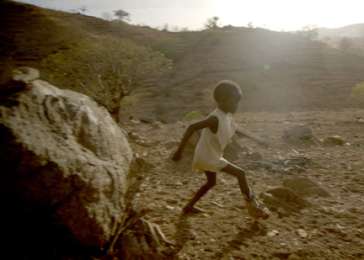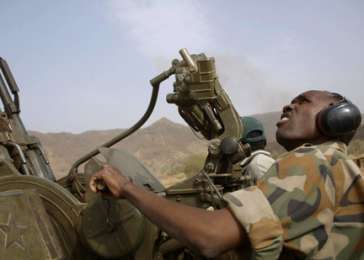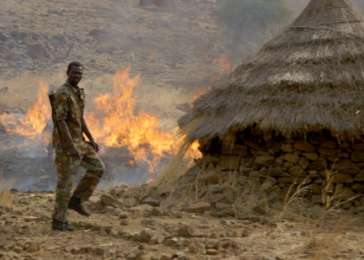June 04, 2013

Over the past two years, a humanitarian crisis has been building in the border areas between Sudan and South Sudan in the context of a civil war between the government of Sudan and rebels from the Sudan People's Liberation Movement—North. During this period, hundreds of thousands of civilians have fled the fighting, the Sudanese air force is indiscriminately bombing civilian targets, and humanitarian groups are reporting on the dangers of widespread famine because the government of Sudan has been blocking aid from reaching peoples in the Nuba Mountains. The Center for the Prevention of Genocide asked Andrew Berends, an experienced documentary filmmaker who is in the Nuba Mountains to document the war there for a new film, to share some of his photos and reflections on what he is seeing in this land that has been virtually cut off from outside assistance or eyewitnesses.
Kuti and the Antanov
Text and Photos by Andrew Berends
When the Antanov comes, you’re supposed to hit the dirt or get in a foxhole. The Antanov is a Russian-made cargo plane used throughout Africa. In the Republic of Sudan, it is used to drop poorly aimed bombs throughout the Nuba Mountains, Darfur and Blue Nile. Sudan’s government claims it is targeting rebel fighters, but the practice has forced a few hundred thousand Nuban civilians to flee to neighboring South Sudan and to mountainous areas where they can hide in caves whenever the airplane comes.
I was in the village of Jegebah to visit General Jagot Makuwar, 2nd in command of the Sudan People’s Liberation Army—North (SPLM-N). Nestled in a rocky valley, Jegebah is a beautiful, sleepy village and home to a host of rebel soldiers. My translator, Ajurad, and I were in the midst of conducting an interview when we heard the hum of the Antanov coming fast and loud. “Zook,” I yelled, and we started running toward the truck-mounted, Russian-made anti-aircraft weapon known here by that name. I wanted to film the rebel gunner firing the heavy caliber weapon. As we neared the Zook, I heard the explosions of two bombs from the Antanov landing a few hundred yards behind us. I turned to see Ajurad lying down on the ground as a single piece of shrapnel whizzed over our heads. I followed his lead and then managed to film the rebel gunner futilely fire off three bursts at the high-flying airplane.
There’s a part of me that wishes the gunner hit his target. In Jegebah, the only casualty was a goat. Later, however, that same Antanov proceeded to drop more bombs in other villages in the Nuba Mountains killing both rebels and civilians.
In the village of Lwere, six-year-old Kuti’s mother and aunt had climbed a tree to collect migrating grasshoppers that they could roast for food. Kuti and his older brother Kuku were on the ground underneath the tree. Just like in Jegebah, the Antanov came in fast and dropped a series of bombs. Kuti’s mother and brother were killed almost instantly. Kuti’s aunt stayed alive, but only for a little while. According to a nurse who works at a nearby clinic, one side of her face was completely blown off and she bled to death. As for Kuti, a piece of shrapnel took off the front half of his foot.
The Antanov does most of its killing in a less direct and more insidious fashion—supporting a war effort that uses food as a weapon. The massive displacement of civilians accompanied by a poor rainy season in 2012 has led to severe food insecurity and malnutrition. The Antanov drops bombs. The civilians flee their homes. They can’t plant, and the food cycle is disrupted. Since the outbreak of hostilities in 2011, Sudan’s government has prohibited humanitarian assistance from entering the Nuba Mountains, Darfur and Blue Nile. The United Nations High Commissioner for Refugees is managing camps in South Sudan and the World Food Programme is giving the refugees food. But they say they have to respect Sudan’s sovereignty and can’t send aid across the border where there are hundreds of thousands in need.
Since Kuti’s family was decimated almost three months ago, I have traveled around the Nuba Mountains and have witnessed a lot of hungry people. Many families are out of food. They eat leaves, grasshoppers, bugs and tiny fruits to supplement whatever sorghum they can find. This is not to say that everyone is starving. Families share food, and some are better off than others. There is livestock. If you have money, you can buy food in the market. But there are days when people don’t eat, and I have seen many malnourished children. I have seen two children starve to death.
Today, Kuti is living with his grandmother on the side of a mountain about fifteen meters from the tree where his mother died. In the late afternoon, the view from their hut is majestic. The past few days the skies have been filled with stunning formations of silver-lined clouds that are usually almost entirely absent during the long dry season. Kuti’s grandmother is waiting for the rains to come so she can plant. Kuti hobbles around and wrestles playfully with his cousins, but there is sadness in his eyes even when he smiles. Not only has he lost his mother, aunt and brother, his father has gone off and joined the SPLA-N. He told me that after what happened to his family, he had no choice but to join the rebels. And in very harsh language, he told me that if he could get his hands on Sudan’s president Omar al-Bashir he would slaughter him like a goat.
